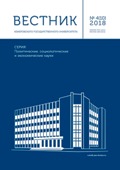Kemerovo, Kemerovo, Russian Federation
The auther reviews the multi-authored monograph "Normal Anomie" in Russia and the Modern World". The monograph examines the use of the concepts "anomie" and "anomial state" that are currently undergoing a serious transformation. The authors investigate some "pathological" forms of society, taking into account the possibilities of a holistic sociological review of the state of affairs in such relevant areas as the methodology of the anomial state of modern society, the correlation of threats and expectations of risks in the modern world, "anomie" and "norm" on the Internet, etc. The monograph demonstrates the problem of methodological gap between the studies of normal anomie problems in a society of risks and vulnerabilities and the choice by Russian citizens of new nonlinear schemes and technologies of social relationships. The emerging situation of "normal anomie" has a positive functional orientation, which is largely due to the consequences of world globalization processes. The authors of the monograph believe there is a possibility that Russian society will use a holistic / systemic picture of the transformation of social conditions, taking into account the specific application of the sociological approach in the study of the "new anomie". It is emphasized that the anomial state is the norm of social development of the modern time. Ambivalence in assessing events, resources, tools, and temporal characteristics allows us to consider the multiple, mobile, and "living picture" of the transformation of social relations in the modern world.
typology of anomial states, social transformations, innovations, sociological studies, social risks
1. Kravchenko S. A. Mosty, soediniaiushchie raskoly sotsiologii, radi bolee ravnogo mira [Bridges connecting all possible gaps in sociology for a more equal world]. Sotsiologicheskie issledovaniia = Sociological studies, no 8. (2006): 29-38.
2. Kravchenko S. A. Sotsiologicheskaia diagnostika riskov, uiazvimostei, doveriia [Sociological diagnosis of risks, vulnerabilities, and trust]. Moscow: MGIMO-Universitet, 2016, 431.
3. "Normalnaia anomiia" v Rossii i sovremennom mire ["Normal anomie" in Russia and the modern world]. Ed. Kravchenko S. A. Moscow: MGIMO-Universitet, 2017, 281.
4. Baudrillard J. Simvolicheskii obmen i smert' [Symbolic exchange and death]. 3rd ed. Moscow: Dobrosvet, Izdatelʹstvo KDU, 2009, 387.
5. Mann M. Globalizatsiia i 11 sentiabrya [Globalization and September 11]. Sotsiologicheskaia teoriia: Istoriia, sovremennost', perspektivy [Sociological Theory: History, Modernity, Perspectives]. Saint-Petersburg: Vladimir Dal, 2008, 596-606.
6. Bourdieu P. Formy kapitala [Forms of capital]. Zapadnaia ekonomicheskaia sotsiologiia. Khrestomatiia sovremennoi klassiki [Western economic sociology. Reader of modern classics]. Moscow: ROSSPEN, 2004, 519-536.
7. Therborn G Mir: rukovodstvo dlia nachinaiuschih [World: A Beginner's Guide]. Transl. Gorbunova E. M., Titarenko L. G. Sci. Ed. Gavrilenko S. M. 2 nd ed. Moscow: Izd. dom VShE, 2017, 336.
8. Penn M. J., Zalesn K. E. Mikrotendentsii: malen'kie izmeneniia privodiaschie, k bol'shim peremenam [Microtendencies: Small changes leading to major changes]. Transl. Savinova A. V. Moscow: AST: AST MOSKVA, 2009, 510.
9. Innovatsionnyi chelovek i innovatsionnoe obschestvo [Innovative man and an innovative society]. Ed. Suprun V. I. Novosibirsk: Trends, 2012, 424.
10. Ratti C., Claudel M. Gorod zavtrashnego dnia: Sensory, seti, khakery i budushchee gorodskoi zhizni [Tomorrow's City: Sensors, networks, hackers and the future of urban life]. Transl. Bondal E. Moscow: Izd-vo Instituta Gaidara, 2017, 248.
11. Tikhonova N. E. Sotsial'naia struktura Rossii: teorii i real'nost [The social structure of Russia: theory and reality]. Moscow: Novyi khronograf: In-t sotsiologii RAN, 2014, 408.
12. Florida R. Kreativnyi klass: liudi, kotorye meniaiut budushchee [Creative class: people who change the future]. Moscow: Klassika-XXI, 2007, 421.
13. Kravchenko S. A. Strela vremeni: sovremennye vyzovy sotsiologicheskomu znaniiu [The arrow of time: modern challenges to sociological knowledge]. Sotsiologicheskaia nauka i sotsial'naia praktika = Sociological science and social practice, no. 1 (2014): 110-124.





















